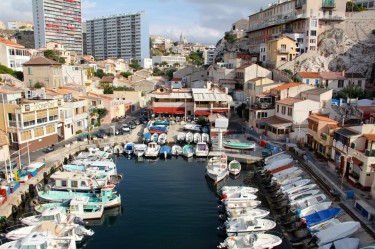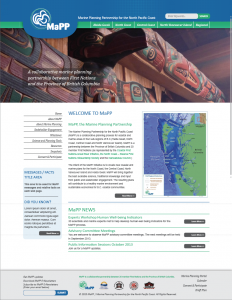Only have a couple of minutes? Discover the “Ten things you need to know about MaPP” in our new video.
[vimeo clip_id=88206954 byline=0 portrait=0 title=0 width=756 height=420]


Only have a couple of minutes? Discover the “Ten things you need to know about MaPP” in our new video.
[vimeo clip_id=88206954 byline=0 portrait=0 title=0 width=756 height=420]
With sadness the MaPP team acknowledges the passing of Bill Johnson on December 9, 2013. The MaPP initiative is grateful to Bill’s contributions as a representative of the renewable energy sector to the North Coast Marine Plan Advisory Committee and on other advisory committees. The MaPP team sends condolences and deep sympathy to Bill’s family. For more information please visit William Johnson Obituary.

 MaPP initiative partners attended two international conferences in October to learn from peers in the global marine planning community and to share some of the ground-breaking work underway in the MaPP initiative.
MaPP initiative partners attended two international conferences in October to learn from peers in the global marine planning community and to share some of the ground-breaking work underway in the MaPP initiative.
MaPP representatives presented at the International Marine Protected Area Congress 3 (IMPAC3) in Marseille, France in October 2013. The IMPAC meets every four years and brings together marine stakeholders from around the globe to assist in the conservation and sustainable development of the world’s oceans.
Two Marine Coordination Team (MCT) members attended the meeting to make presentations and attend workshops. Charlie Short (Province of British Columbia) and Steve Diggon (Coastal First Nations –Great Bear Initiative) participated in a workshop on marine protected areas (MPAs). They presented modeled spatial scenarios for protection areas that were developed in collaboration with the British Columbia Marine Conservation Analysis (BCMCA). The scenarios help MaPP to identify high-priority conservation areas to inform spatial zoning in the MaPP initiative’s four sub-regions.
The MaPP team members also took part in a session to discuss ocean zoning and the initiative’s ecosystem-based management (EBM) approach where they learned about challenges and lessons from other regions around the world. Short says, “Many countries are struggling with similar issues around governance, science, and stakeholder and public participation.”
Short and Diggon also met with experts and leaders who, like the MaPP team members, consider the ecological, social, cultural and economic aspects of marine protection.
“MaPP seems to be on the leading edge of marine spatial planning and MPA identification,” says Short. “There was a lot of interest in the MaPP process and the techniques we are using.”
North Pacific Marine Science Organization
Matthew Justice, MaPP MCT (Province of B.C.) and North Vancouver Island sub-region co-lead, and MaPP science coordinator Jo Smith, Ph.D. presented at the North Pacific Marine Science Organization (PICES) conference held in Nanaimo from October 16-18, 2013.
PICES is an intergovernmental scientific organization, formed in 1992, to promote and coordinate marine research in the North Pacific and adjacent seas. At the annual conference, scientists, managers and policy makers met to discuss recent advances in oceanography, fisheries, and marine mammal and bird populations, as well as management topics such as indicators, pollutants and communication.
The MaPP representatives presented an overview of the planning process. They also described the methods being used to develop ecosystem-based management (EBM) indicators in a collaborative project with West Coast Aquatics and Andrew Day of Uuma Consulting Ltd. The EBM indicator work is important for implementing MaPP marine plans, monitoring progress and achieving plan objectives.
Science coordinator Jo Smith says, “Developing indicators is a hot topic right now. MaPP is part of this larger global effort to assess and monitor the state of the oceans and develop indicators for human well-being in coastal and marine areas.” The conference was an opportunity for the MaPP initiative to discuss its EBM indicator development with colleagues working on similar projects in different geographies.
Smith says, “The MaPP EBM indicator work is leading the way by simultaneously developing ecological and human well-being indicators for B.C.” At the same time, she says that the MaPP initiative is learning from quantitative research on high-level indicators and ecological risk assessment models done in Alaska, Puget Sound, Georgia Strait and the California Current Ecosystem.

 The Marine Plan Partnership for the North Pacific Coast (MaPP) introduces a refreshed website. New to the site is the Marine Planning Portal – a chance for you to explore a sophisticated marine planning tool with well over 200 data sets. Also check out MaPP Snapshots, a new section that offers stories of life, work, recreation, industry, culture, economic opportunity and biodiversity on B.C.’s North Pacific Coast.
The Marine Plan Partnership for the North Pacific Coast (MaPP) introduces a refreshed website. New to the site is the Marine Planning Portal – a chance for you to explore a sophisticated marine planning tool with well over 200 data sets. Also check out MaPP Snapshots, a new section that offers stories of life, work, recreation, industry, culture, economic opportunity and biodiversity on B.C.’s North Pacific Coast.
In addition, we have streamlined the site navigation, added more information and included many more photographs that capture the natural splendour, diversity and complexity of this vast marine area. Thank you to all the gifted photographers who have contributed their work.
When the MaPP draft marine plans are ready for public review, you’ll find all the information you need on our website about the draft plans and how to provide your input.
The site will continue to evolve over time as new information is available. For the latest information, please subscribe to MaPP updates and to the MaPP newsletter.

 The Marine Plan Partnership for the North Pacific Coast (MaPP) announces the extension of the MaPP Initiative completion date from December 31, 2013 to June 30, 2014.
The Marine Plan Partnership for the North Pacific Coast (MaPP) announces the extension of the MaPP Initiative completion date from December 31, 2013 to June 30, 2014.
The MaPP Marine Working Group is pleased to report that marine plans are on track for completion within the original timeline. The additional six months is required to complete stakeholder, public and partner review of the draft plans and regional framework and to plan for implementation.
Once completed, the four MaPP sub-regional marine spatial plans and the regional framework will provide recommendations on marine uses and activities, marine protection and other key areas of marine management to inform decisions regarding the stewardship of British Columbia’s coastal marine environment.
We thank all the advisory committee members, stakeholders, partners, supporters and the MaPP planning team for their continued commitment to the MaPP Initiative and its successful completion.
MaPP Marine Working Group
Merv Child – Nanwakolas Council
Craig Outhet (Interim) – North Coast-Skeena First Nations Stewardship Society
Allan Lidstone – Government of British Columbia, Ministry of Forests, Lands and Natural Resource Operations
Trevor Russ – Haida Nation
Spencer Siwallace – Central Coast Indigenous Resource Alliance
Garry Wouters – Coastal First Nations